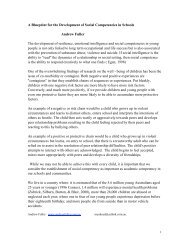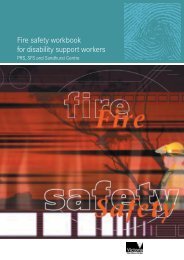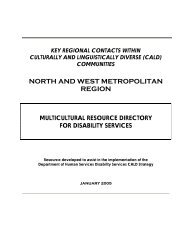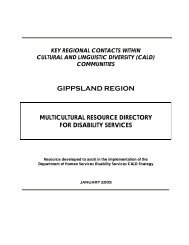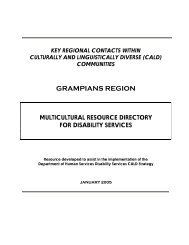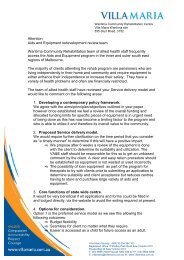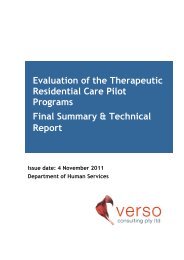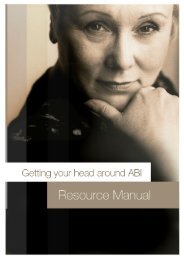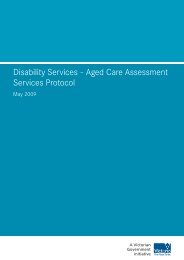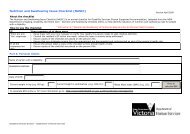Positive Behaviour Support - Department of Human Services - Vic ...
Positive Behaviour Support - Department of Human Services - Vic ...
Positive Behaviour Support - Department of Human Services - Vic ...
Create successful ePaper yourself
Turn your PDF publications into a flip-book with our unique Google optimized e-Paper software.
PowerPoint 52*<br />
PowerPoint 53<br />
PowerPoint 54<br />
*<br />
*<br />
<strong>Positive</strong> behaviour support: Getting it right from the start - Facilitators reference manual 33<br />
Importance <strong>of</strong> knowing the person’s preferences and abilities<br />
As you complete each activity you are building up a pr<strong>of</strong>ile <strong>of</strong> the person you support.<br />
This information is important when developing a positive behavioural support plan.<br />
For the person you support identify the following:<br />
• How would you use PCAS to provide the right support for experiencing success?<br />
• What are the person’s likes and dislikes?<br />
• What are the person’s strengths and weaknesses<br />
• Can the person you support make choices – if so how do they show this?<br />
• How does the person you support recognise and express their emotions?<br />
• What is the person’s personality type?<br />
• Are they assertive?<br />
• Do they have a high self-esteem?<br />
• Are they motivated?<br />
• What social skills does the person have? Can they initiate a conversation? Take turns in a<br />
conversation? Do they have the language to maintain a conversation?<br />
Add this information to your client pr<strong>of</strong>ile.<br />
As a group think about the best way to collect and present this information.<br />
Ideas could include developing an ‘All about me book’ or communication passports to<br />
document the person’s preferences and abilities.<br />
<strong>Human</strong> relations and sexuality 5<br />
People with developmental disability have the same sexual desires and needs as the rest <strong>of</strong><br />
the community. There are many myths surrounding the sexuality <strong>of</strong> people with an intellectual<br />
disability. They are <strong>of</strong>ten seen as either asexual or childlike and in need <strong>of</strong> protection, or<br />
conversely as oversexed and in danger <strong>of</strong> becoming promiscuous and perverted.<br />
There are differences, however, but these have more to do with different life experiences and<br />
opportunities to learn, rather than the individual’s inherent sexuality. It is by acknowledging and<br />
acting upon these differences that people with a developmental disability can be best assisted to<br />
develop their full potential.<br />
Most information about sexuality and relationships is acquired through life experiences. People<br />
with a disability:<br />
• tend to be overprotected by others, or be limited due to their level <strong>of</strong> disability<br />
• <strong>of</strong>ten have difficulty learning and generalising abstract social rules and patterns <strong>of</strong> behaviour or<br />
they learn them in a rigid and literal manner<br />
• sometimes learn inappropriate behaviours from others (both with and without disabilities).<br />
5. Management Guidelines, Developmental Disability. Version 2(2005) pp 183 <strong>Human</strong> Relations and Sexuality<br />
published and distributed by Therapeutic Guidelines Limited. <strong>Vic</strong>toria, Australia.



